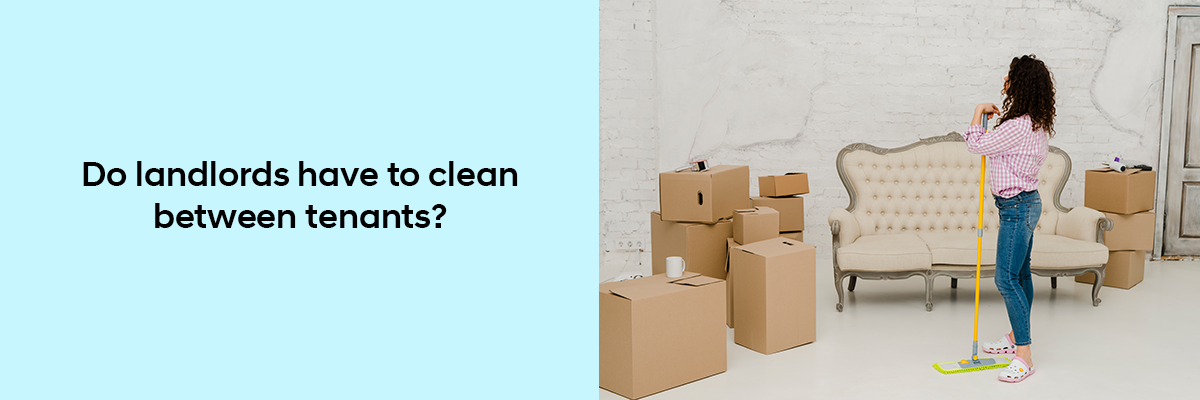Every new tenant has the right to move into a clean, functional, and well-maintained property. This is the bare minimum that any responsible landlord or property manager should provide. A clean and habitable unit not only ensures tenant satisfaction but also helps maintain the property’s value and reduces potential disputes. But what are a landlord’s actual responsibilities when it comes to cleaning between tenants? Let’s break it down step by step.



What Are a Landlord’s Cleaning Responsibilities?
Legally, landlords are required to provide a rental unit that meets health and safety standards. While the exact cleaning requirements vary by location, the general expectation is that the unit must be free of hazards, pest infestations, and unsanitary conditions. To meet these standards, landlords should ensure:
- Basic cleanliness: Floors, walls, ceilings, and common areas should be swept, vacuumed, or mopped.
- Appliance maintenance: Stoves, ovens, refrigerators, and dishwashers should be in working order and cleaned.
- Plumbing checks: Sinks, showers, and toilets should be sanitized and free from clogs.
- Pest control: Any evidence of rodents, insects, or other infestations must be addressed before a new tenant moves in.
- Trash removal: Leftover garbage or abandoned belongings from previous tenants should be disposed of properly.
Is the Previous Tenant Responsible for Cleaning?
While landlords are responsible for providing a clean rental, departing tenants also have obligations. Typically, lease agreements require tenants to leave the unit in the same condition as when they moved in, aside from normal wear and tear. This usually includes:
- Sweeping or vacuuming floors.
- Wiping down countertops and appliances.
- Taking out all the trash.
- Cleaning the bathroom.
- Removing personal belongings.
If a tenant fails to meet these requirements, landlords can deduct cleaning costs from the security deposit, as long as the deductions are reasonable and documented. However, deductions cannot be made for normal wear and tear, such as faded paint or minor carpet wear.
What Should Landlords Do If the Tenant Leaves a Mess?
If a tenant leaves the unit in poor condition, landlords have a few options:
- Use the security deposit: If the lease allows, landlords can deduct cleaning expenses from the deposit, provided they give an itemized list of deductions.
- Hire professional cleaners: If the unit is excessively dirty or has strong odors (such as smoke or pet smells), professional cleaning services may be necessary.
- Document everything: Take photos and detailed notes before and after cleaning to avoid disputes with former or new tenants.
- Consider legal action: In extreme cases where the damage exceeds the security deposit, landlords may need to pursue legal action to recover additional costs.
Can Landlords Pass a Dirty Unit to a New Tenant?
Legally and ethically, landlords should not pass a dirty unit to a new tenant. Even if the previous tenant failed to clean, it remains the landlord’s responsibility to ensure the property is move-in ready. Renting out an unclean unit can lead to:
- Complaints and potential legal issues.
- Negative reviews that damage reputation.
- Higher turnover rates due to dissatisfied tenants.
How to Clean a Property After a Long Vacancy
If a rental unit has been vacant for a long period, additional cleaning steps may be necessary:
- Dust and sanitize: Even if the unit was clean when vacated, dust accumulates over time. Wipe down surfaces, cabinets, and windows.
- Run water and check plumbing: Stagnant water can cause unpleasant odors. Run sinks, flush toilets, and check for leaks.
- Inspect for pests: Empty units can attract pests, so check for signs of infestations.
- Check HVAC and ventilation: Replace air filters and ensure proper airflow to eliminate stale air and potential mold.
So, to answer the question “Do landlords have to clean between tenants?”, the answer is a resounding YES. As we’ve outlined, ensuring a clean and habitable unit is not just a best practice but often a legal requirement. A well-maintained property leads to better tenant satisfaction, protects the landlord’s investment, and minimizes disputes.
How can you do this? By using preventive maintenance. It keeps your rental property in good condition—whether it’s occupied or vacant—so it’s always ready for the next tenant.
We hope you found this blog informative and helpful. If you’re looking to expand your knowledge on fair housing laws and best practices, be sure to check out our Fair Housing Webinar page, where you can access a wealth of expert-led sessions, both upcoming and previously recorded, to stay informed and compliant.
Conclusion
While previous tenants have some responsibility to clean before they leave, landlords must ensure that the rental unit is in a clean, habitable, and well-maintained condition before handing it over to a new tenant. A well-kept property not only attracts responsible renters but also minimizes long-term maintenance issues and legal complications. By setting clear expectations and enforcing lease terms, landlords can maintain high standards and ensure smooth tenant transitions.


